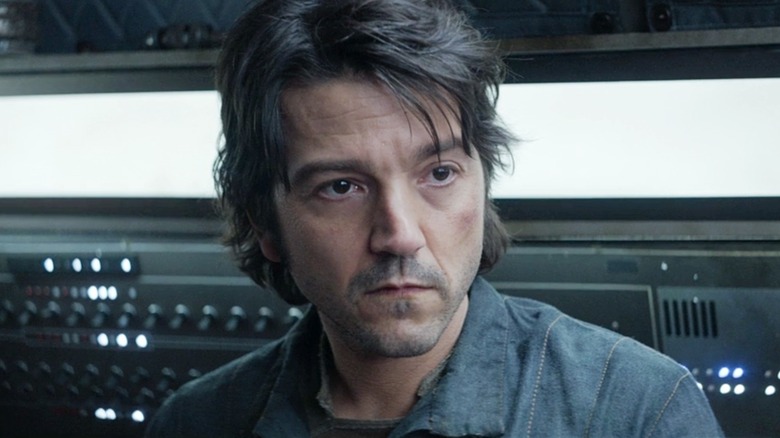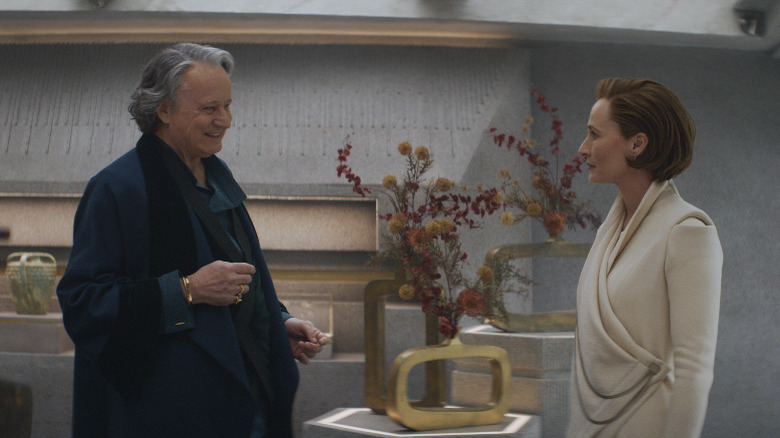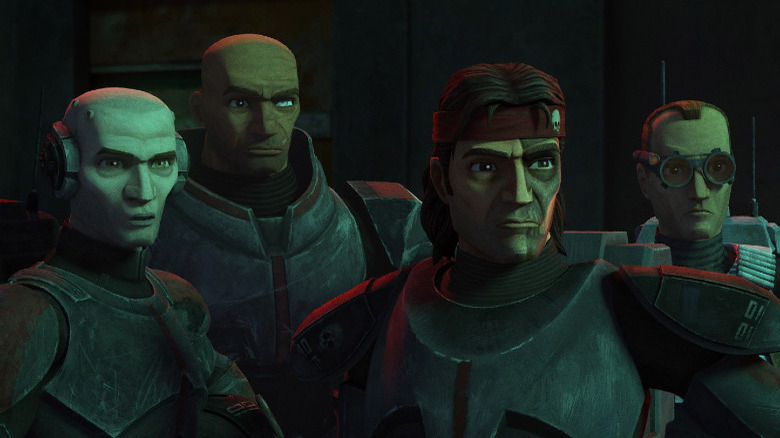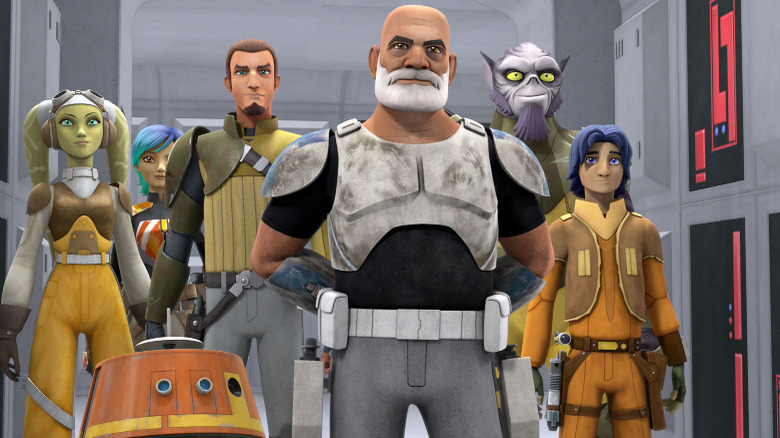How Andor Complements The Animated Star Wars Shows
This post contains spoilers for "Andor" episode four.
When it comes to projects set in what Obi-Wan Kenobi once dubbed the "dark times" betwen the original and prequel trilogies, the "Star Wars" franchise has a bit of a mixed track record. "Solo: A Star Wars Story," for example, is a perfectly fun heist adventure. But unless the only thing you care about is learning how Han Solo got all his cool stuff, it's not exactly enlightening with respect to this highly fraught period in "Star Wars" history.
On the other hand, there's "Rogue One: A Star Wars Story." What might've been a movie that existed solely to fill in a so-called "plot hole" from "Star Wars: A New Hope" (why the first Death Star had a weak spot in its design) proved to a daring take on the franchise — one that embraced a grittier and more adult tone that past films, culminating with all of its heroes dying in the third act. In doing this, it also reframed Luke Skywalker's famous trench run from "A New Hope." No longer the actions of a "chosen one," it's clear now this victory would've been impossible without the sacrifices of Cassian Andor (Diego Luna) and his ragtag team of Rebels.
With its fourth episode, the "Rogue One" prequel/spinoff series "Andor" has started diving even deeper into the "dark times" and how the rebellion against the Galactic Empire even came to be. Of course, for fans of animated series like "Star Wars Rebels" and "The Bad Batch," this isn't newfound territory. But what's really interesting is the ways "Andor" is exploring the story of the Rebel Alliance from a different (and, as such, complementary) angle than either of those shows.
You say you want a revolution...
In "Andor" episode four, Cassian is recruited by Luthen Rael (Stellan Skarsgård) to assist with a Rebel mission on the planet Aldhani. It's a barebones operation no matter how you look at it, with most of the team's half-dozen members having spent weeks sleeping on little more than dirt and rocks in the lead-up. That and Cassian is the only one of them getting paid, a fact Luthen requests the crew's leader, Vel Sartha (Faye Marsay), keep to herself.
The episode later picks up with Luthen in his special artifacts shop on Coruscant. There, he and his fellow Rebel leader Mon Mothma (Genevieve O'Reilly) have a discreet discussion about securing the financing he needs to carry out the heist on Aldhani. Far from thrilled, Mon makes it clear just how difficult it will be for her to get him this money without arousing suspicion from the planet's Imperial forces.
Thanks to its first three episodes, it's obvious anti-Imperial sentiment is spreading (or, as Sgt. Mosk put it, "fermenting") all over the galaxy by the time the show begins. The issue isn't finding people ready and willing to revolt against the Empire. No, the real problem for Luthen and Mon is assembling the resources and manpower they need to even start this rebellion while they still have the much-needed element of surprise.
Compare this to "Star Wars Rebels," which takes place at the same time as "Andor." There, the focus is on one such pocket of "fermenting" on the planet Lothal. However, because none of the show's heroes start out as Rebel leaders, their struggle has less to do with funding or forming a crew (which they've already done) and more to do with coordinating their efforts with other Rebel sects across the galaxy.
If you can't beat 'em, join 'em
Winding the clock back even further, "The Bad Batch" takes place 14 years prior to both "Andor" and "Rebels." But even then, the rebellion is already starting to congeal, with "Clone Wars" fan-favorite Captain Rex among those depicted forming their own small resistance groups.
So why, then, has little changed a decade and a half later? Well, as "The Bad Batch" reveals, sentiment towards the Empire wasn't so bad at first. Wanting to replace its clone troopers with far less costly conscripted soldiers, the Imperials are shown offering food, boarding, and pay to anyone willing to join its armed forces. After years of life under the ineffectual Old Republic, it's a tempting deal for many civilians — one that makes it easier for them to pay no attention to the fascist behind the curtain.
By the time we get to "Rebels" and "Andor," though, the Empire has shown its true colors. Thing is, the longer anyone lives under a totalitarian regime, the easier it becomes for them to normalize their reality or even delude themselves into thinking their overlords have their best interests at heart (unless you're one of the ultra-rich and powerful, in which case they do). By showing how the Imperials got their foot on the galaxy's neck to begin with, "The Bad Batch" sets the stage for many of the obstacles faced by the leads on other "Star Wars" prequel series.
Heroes of different shades
Perhaps the most interesting way "Andor," "Rebels," and "The Bad Batch" complement one another is how they paint both the Rebels and Imperials in deeper shades of grey. While he's far from a friend of the Empire, the Cassian we meet early on in "Andor" is a fairly cynical survivalist. He accepts the Aldhani job from Luthen, but only for a healthy payment. And even then, he's visibly tempted to take off on his ship when Luthen steps out to speak with Vel.
"Rebels" lead Ezra Bridger, on the other hand, is a young idealist all-too-ready to stick it to the Empire right out the gate, as are the rest of his found Rebel family. They're each haunted by traumas in their pasts, yet their actual morals are never in question. Even as he trains in the ways of the Force and wrestles with the dark side, there's no doubt Ezra will overcome his demons in the end.
Clone Force 99 on "The Bad Batch" makes for a nice middle ground between these extremes. Their leader Hunter is mainly concerned with protecting his clone family at the start of the show, what with them being fugitives from the Empire. He'll aid rebels-in-the-making and avoid any kind of unscrupulous mercenary work, but when push comes to shove his goal (for now) is to stay off the Imperials' radar.
As "Andor" shows us, though, it takes heroes of all shades working together to bring about real change. It's an idea that goes all the way back to "A New Hope" but has come to take on greater significance, now that we know just how hard it was to even form the Rebel Alliance in the first place.
New episodes of "Andor" premiere Wednesdays on Disney+.



